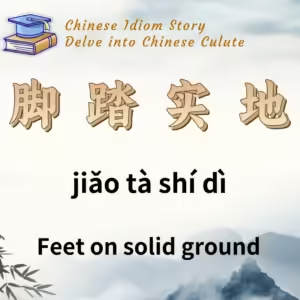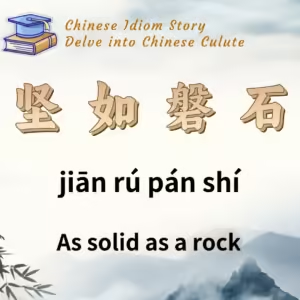
Chinese Idiom: 脚踏实地 (Jiao Ta Shi Di)
English Translation: Feet on solid ground
pīn yīn: jiǎo tà shí dì
Idiom Meaning: To work diligently and earnestly; to be pragmatic and realistic, avoiding exaggeration or superficiality.
Historical Source: From the Song Dynasty scholar Shao Bowen’s “Records of Shao’s Observations” (《邵氏闻见录》), Volume 18; also found in Ma Yongqing’s “Lazy Zhenzi” (《懒真子》).
Idiom Story:
During the Northern Song Dynasty, a renowned historian named Sima Guang emerged from Xi County in Shanxi Province (present-day Xia County, Shanxi). Sima Guang, whose courtesy name was Junshi, was born in 1019 AD. He began his official career at the age of twenty and is best known for compiling a historical work titled “Zizhi Tongjian” (《资治通鉴》).
From a young age, Sima Guang had a passion for reading historical texts. He observed that, despite the vast number of historical works available, one could spend a lifetime reading without exhausting the material. Thus, he aspired to distill the essence of these histories into a concise and systematic chronicle.
Commissioned by Emperor Yingzong of Song, Sima Guang led the editing of the “Tongjian” with the help of historians like Liu Fang, Liu Shu, and Fan Zuyu. It took him nineteen years to complete this monumental work, finishing in the seventh year of Emperor Shenzong’s reign (1084 AD). The “Zizhi Tongjian” spans from the Warring States period to the Five Dynasties, recounting significant events over 1,362 years in chronological order, comprising 294 volumes, plus 30 volumes of directories and 30 volumes of examinations, totaling over three million words. It is a remarkably rich and scientifically valuable text.
The creation of such a monumental work required immense intelligence and hard work from Sima Guang, reflecting his diligent and pragmatic approach to scholarship. Legend has it that as a child, he studied alongside his brothers. Noticing that he had a poor memory compared to them, he was determined not to fall behind. Whenever his brothers finished reading and went out to play, he would stay indoors, close the doors and windows, and read aloud repeatedly until he could recite the material fluently.
During the compilation of “Zizhi Tongjian,” Sima Guang immersed himself in research and writing. He often worked late into the night, sleeping only a few hours. At dawn, he would rise to continue his writing. To prevent oversleeping and hindering his work, he fashioned a wooden “alarm pillow” to ensure he didn’t sleep too soundly. People who saw the original manuscript of “Zizhi Tongjian” noted that each character was written neatly without a single scribbled word. The leftover drafts filled two entire rooms in Luoyang.
One day, when Sima Guang asked his friend Shao Bowen’s father, Shao Yong, for his opinion about him, Shao Yong replied, “Junshi, you are a person who keeps your feet on solid ground.” This means: you approach work and scholarship with a pragmatic, realistic attitude, doing things earnestly and meticulously.
Thus, the phrase “Junshi, you are a person who keeps your feet on solid ground” was later simplified and extended to become the idiom “脚踏实地.”






